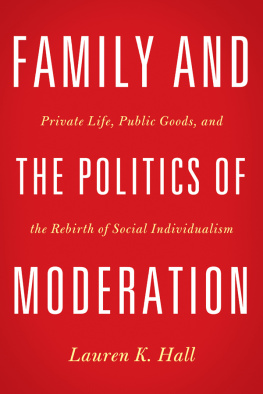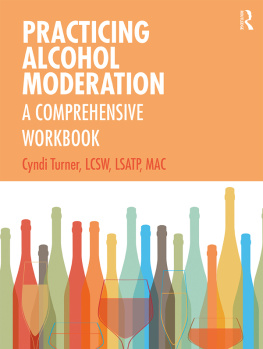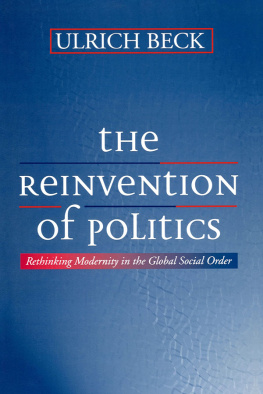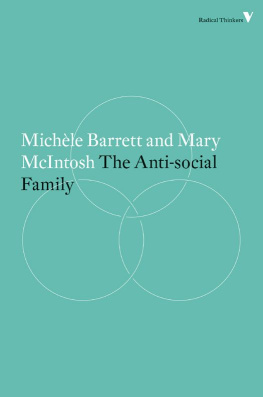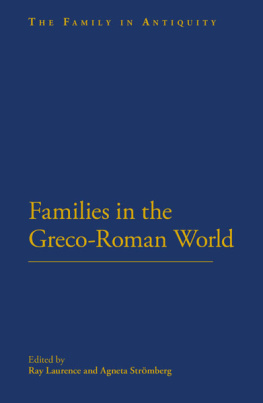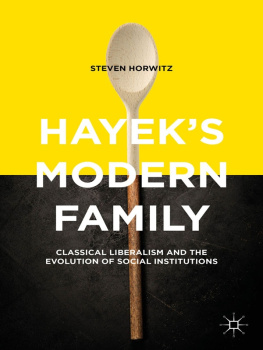FAMILY AND THE POLITICS
OF MODERATION
PRIVATE LIFE, PUBLIC GOODS, AND THE
REBIRTH OF SOCIAL INDIVIDUALISM
Lauren K. Hall
BAYLOR UNIVERSITY PRESS
2014 by Baylor University Press
Waco, Texas 76798
All Rights Reserved. No part of this publication may be reproduced, stored in a retrieval system, or transmitted, in any form or by any means, electronic, mechanical, photocopying, recording or otherwise, without the prior permission in writing of Baylor University Press.
Jacket Design by Faceout Studio/Kara Davison
eISBN: 978-1-4813-0186-2 (e-Mobi/Kindle)
eISBN: 978-1-4813-0208-1 (ePub)
This E-book was converted from the original source file by a third-party vendor. Readers who encounter any issues with formatting, text, linking, or readability are encouraged to notify the publisher at . Some font characters may not display on all e-readers.
To inquire about permission to use selections from this text, please contact Baylor University Press, One Bear Place, #97363, Waco, Texas 76798.
Library of Congress Cataloging-in-Publication Data
Hall, Lauren K., 1980
Family and the politics of moderation : private life, public goods, and the rebirth of social individualism / Lauren K. Hall.
198 pages cm
Includes bibliographical references and index.
ISBN 978-1-60258-801-1 (hardback : alk. paper)
1. Families. 2. Individualism. 3. Collectivism. I. Title.
HQ734.H2545 2014
306.85dc23
2013020151
Printed in the United States of America on acid-free paper with a minimum of 30% post-consumer waste recycled content.
To my family, including those I have lost,
those with whom I share today, and those I have not yet met.
But especially to Piper, whose presence in the world makes
the subject of this book infinitely more meaningful.
CONTENTS
ACKNOWLEDGMENTS
I have been very fortunate during the writing of this book to have had wonderful advisors, mentors, and intellectual accomplices. Each devoted valuable time and intellectual energy to challenge my ideas and to sharpen my writing. There have been many colleagues, advisors, and friends who have supported me throughout the years, and the following is but a partial acknowledgment of debt.
Professors Gary Glenn and Larry Arnhart sparked my interest in the works of Burke and Montesquieu, and their careful and attentive mentoring helped guide my research and writing from that of a fledgling graduate student to what it is today (whatever that might be). They also, even after retiring, read through drafts at various stages of this work. Their thoughtful comments and criticism were crucial to helping me clarify my arguments. Larrys generosity as an advisor has known no bounds, and his willingness to respond to frantic e-mails with calm guidance will always be remembered with gratitude.
Steve Horwitz and Sarah Mackenzie Burns looked over early drafts of the chapter on family forms and helped me rein in what was becoming an unwieldy beast. Panelists at the Midwest Political Science Association and American Political Science Association meetings helped improve early formulations of the argument made in the book, and conversations at Liberty Fund conferences helped me locate sources and provide theoretical rigor. The support of a Jack Miller Center Summer Fellowship in the summer of 2010 allowed me to meet with editors including Steve Wrinn from University of Kentucky Press and John Tryneski from University of Chicago Press, both of whom provided generous follow-up advice.
Closer to home, I have had the unflagging support of the Department of Political Science and the College of Liberal Arts at the Rochester Institute of Technology for the three years it took to write the book and secure a contract. The Paul and Francena Miller Research Fellowship from the College of Liberal Arts in 2011 provided time off from teaching to finish the first draft of the book and the prospectus to send out to publishers. A Grant Writing Boot Camp Award from the Office of Sponsored Research Services at RIT provided me with course release time and funds for initial copyediting of chapters to be sent out for review. The Department of Political Science and my indefatigable chair, Sean Sutton, provided both intellectual guidance and flexibility with course releases and scheduling.
Carey Newman of Baylor University Press improved the content and the writing of the book immeasurably with attentive commentary and advice. Meanwhile, the support of the staff at Baylor ushered the manuscript through the publishing process with expertise and surprising speed.
Apart from academic support, in a very real sense this book starts and ends with the family. The timing of this book put the strength of my familial support network to the test as I finished the rough draft and secured a contract two weeks before my husband and I welcomed our first child. I spent our daughters first six months of life rewriting and editing the final manuscript in between diaper changes and nursing sessions. This book could not have been finished without the help of an intergenerational platoon, to use Burkes words. My wonderful in-laws, Bill and Marilyn Lilly, watched our infant daughter on many a cold winter morning so I could stew over word choice and organizational structure. Their loving care helped me concentrate on writing, knowing that my daughter was in the best of hands. My own parents, Robert and Deborah Hall, in addition to babysitting, also provided detailed and thoughtful commentaries on early drafts of the major chapters. They have been my most consistent supporters and my most exacting critics.
Finally, my husband Brian Lillys patience supported me throughout. He endured long workdays, writers block, and occasional whining, with his usual unruffled cheer. In the early days of our daughters life, his attentive care of both of us allowed me to strike a balance, albeit an imperfect one, between mothering and writing. For that and for his love I am grateful.
INTRODUCTION
A FAMILIAL FULCRUM
The political project is a curious thingalways imperfect and never completebecause it is predicated on the continuous task of balancing the claims of individuals and the claims of the communities in which they live. The success or failure of this political project, creating harmony out of a multitude of voices, is dependent in part on the ideological foundations that help decide how the needs and interests of individuals are balanced and brought into harmony with the needs and interests of groups.
The ideological clashes between extreme individualism and extreme collectivism can be seen in practical form in the clashes between fascism and capitalism and, later, capitalism and communism. Meanwhile, extreme laissez-faire capitalism supported social Darwinism in both Western Europe and the United States, where the poor were held absolutely responsible for their own poverty.
The incompatibility of both viewsthat the individual is all or the group is allbred increasingly polarized political and economic positions in the twentieth century that made no concessions to the complexities of human life. The refusal to recognize that modern capitalism might have alienated humans from their social roots was pitted against the refusal to recognize limits on how much human nature could be stretched or molded to meet idealistic communitarian goals.
Part of what made the ideological wars of the twentieth century so damaging was that ideological extremism coincided with social, cultural, economic, and technological changes that eliminated the strength of traditional buffers between individual and community claims. These so-called intermediate institutionslocal governments, churches and religious organizations, political and social associations, and the familywere weakened by political centralization and imperialism, economic industrialization that led to urbanization, and the breakdown in traditional family structures caused by increased mobility away from small towns and extended family.

